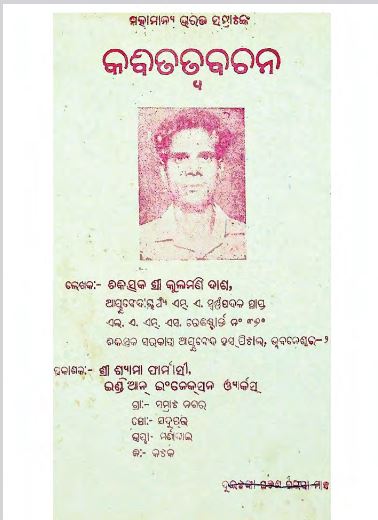In the vibrant tapestry of Indian literature, the poetry book ‘Kabitatwabachana’ by Kulamani Das stands as a unique testament to the harmonious convergence of Hindu and Muslim philosophies. Published in 1980, this remarkable collection of Odia poems delves deep into the timeless quest for spiritual understanding and the inherent unity of diverse religious traditions.
Kulamani Das, a revered name in Odia literature, skillfully weaves his poetic craft to explore profound metaphysical themes. ‘Kabitatwabachana’ is not just a collection of poetic verses but a philosophical treatise that transcends the ordinary boundaries of religious dogma, inviting readers to reflect on the universal truth and essence of existence.
One of the most compelling aspects of ‘Kabitatwabachana’ is its embrace of both Hindu and Muslim spiritual traditions. Through his verses, Das illustrates a deep respect and understanding of both faiths, highlighting their shared values of compassion, devotion, and the pursuit of enlightenment. This synthesis of religious thought is not only a literary feat but also a spiritual guide inviting the readers to seek unity amidst diversity.
The poems in this collection are imbued with rich symbolism and metaphysical queries. Kulamani Das’s words act as a bridge, bringing together the sacred chants of Vedas and the soulful rhythms of Sufi mysticism. His elegant diction and evocative imagery draw readers into a contemplative journey where Hindu and Muslim spiritual paradigms are juxtaposed and intertwined.
In ‘Kabitatwabachana’, the reader encounters the divine omnipresence portrayed through the Hindu concept of Brahman as well as the Islamic notion of Allah. Das poetically explores the idea that ultimate reality transcends all human distinctions and that the essence of the divine is the same regardless of the path one takes to reach it. This theme is reflected in verses that speak to the heart and soul, urging humanity to rise above divisive identities and recognize our shared celestial heritage.
A standout example of this harmonious integration is encapsulated in the poem where Das describes the eternal dance of creation as envisioned in Hindu cosmology and blends it with the Sufi’s whirl, a metaphor for the soul’s journey towards divine love. This masterful blending serves to illustrate the interwoven nature of human understanding across different religious landscapes.
Moreover, ‘Kabitatwabachana’ delves into humanistic themes, emphasizing moral values and ethical principles that resonate across both religions. Probing the depths of love, faith, suffering, and redemption, Das’s poetry transcends religious confines and appeals to a universal audience.
The publication year of 1980 situates ‘Kabitatwabachana’ within a period of significant cultural and political change in India. Amidst these transformations, Das’s work offered a beacon of hope, reminding readers of the enduring power of literature to inspire and unite.
In conclusion, ‘Kabitatwabachana’ by Kulamani Das is an exquisite piece of literary artistry that transcends the temporal and religious divides. It invites readers into a contemplative and spiritual dialogue, beckoning them to perceive the underlying unity in all religious expressions. Through this profound poetic journey, Das illuminates the path to spiritual oneness, offering a glimpse into the divine truth that binds us all. ‘Kabitatwabachana’ remains a poignant and timeless contribution to Odia literature and to the broader quest for spiritual union and harmony.
Books Info
| Books name | Kabitatwabachana/କବିତ୍ବବଚନ |
| Author | Kulamani Das |
| No Of pages | 55 |
| Publisher | Bani Sahity Mandira |
| Publication | 1980 |
| Printed At | Cuttck Mukura Press |
| Distributor | NA |

